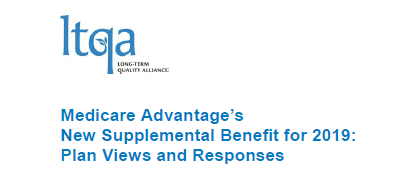Date: November 2018
There is a general lack of financial resources, beyond the Medicaid program, to help individuals with complex care needs afford non-medical services and supports to remain independent in their homes and communities and avoid expensive hospital admissions and/or institutionalization. A promising start to covering this type of care through Medicare was recently enacted in the Bipartisan Budget Act of 2018, as part of the Chronic Care Act. This provision would allow Medicare Advantage (MA) plans greater flexibility in structuring and targeting supplemental benefits, so that plans could offer benefits to “maintain the health or function of chronically ill enrollees” that are not “primarily health-related.”
LTQA interviewed member plans to identify challenges that MA plans face in including a supplemental benefit in their MA bid and preparing to launch it. This report presents LTQA’s findings and recommendations for statutory or regulatory changes, and modifications to the Call Letter and CMS guidance for the 2020 bid cycle.
Acknowledgements
Supported by a grant from The SCAN Foundation – advancing a coordinated and easily navigated system of high-quality services for older adults that preserve dignity and independence.


